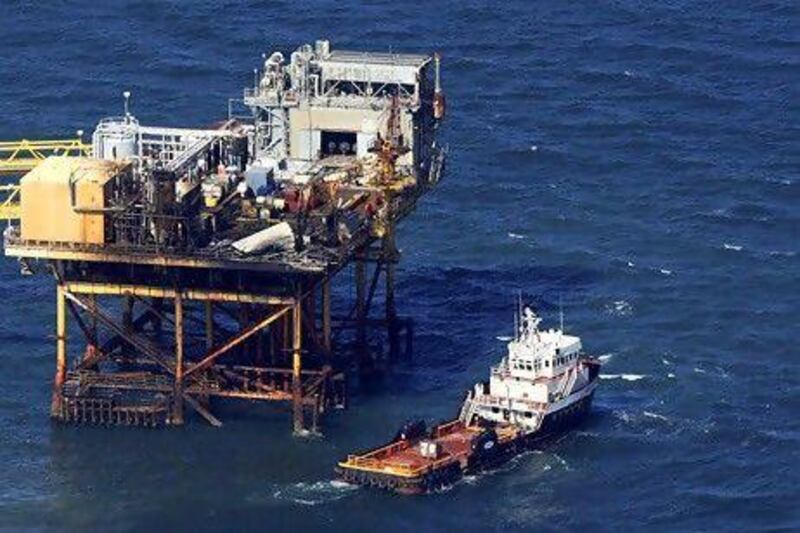The price of oil is proving largely immune to conflict in parts of the region and remains on a generally downward trajectory, mirroring last month.
The Arabian Gulf's overall economic and political stability, increased output in the United States and a backdrop of weakening demand has offset potential supply risks caused by the civil war in Syria and growing geopolitical tensions between Israel and the Palestinian Territories.
"Until there is a clear sign that the instability in the region is spreading toward the oil-producing states, market participants are likely to approach this situation with caution and not overreact to the upside," said Dominick Chirichella of New York's Energy Management Institute.
Meanwhile, an explosion on an oil platform owned by Black Elk Energy Offshore Operations in the Gulf of Mexico on Saturday that left two workers missing is raising questions about the safety and oversight of offshore energy operations only days after BP agreed to a record fine.
On the oil markets, the West Texas Intermediary (WTI) Nymex crude price has plunged by 6.5 per cent to about US$86 a barrel over the past four weeks widening the gap between Brent and WTI, which now stands at about $23 per barrel, the most so far this year.
Opec supply declined slightly last month but the group estimates world crude output increased by 1.01 million barrels per day (bpd) last month while non-Opec supply increased by 1.08 million bpd.
Although the oil price trend is downward, Mr Chirichella did not predict a drastic decline. "As long as the tensions and military activity continue to evolve, oil prices should find some price support in the short term."
The expiring December Brent contract settled up $1.37 at $110.98 a barrel, after stalling ahead of the 50-day moving average of $111.26 a barrel, in light trading on Friday.
The more actively traded January Brent, which will become the front-month contract on Friday, dipped 47 cents to settle at $108.01 a barrel.
December US crude oil futures fell 87 cents to settle at $85.45 a barrel.
Oil traders have been balancing the situation in the Middle East and export problems from the North Sea against ongoing worries about the effect of the struggling US economy on global fuel demand.
"The market was trying to rebound from last week's four-month lows and, when we failed to attract any buying close to the $87 mark [for US oil], the markets turned, and some of the new longs bailed," said Gene McGillian, an analyst at Tradition Energy in Stamford, Connecticut.
"Economic uncertainty continues to derail any efforts for the market to push higher."
News that Statoil had shut its Troll C oil and gas platform in the North Sea due to corrosion in a gas treatment system - cutting Norway's oil production by about 8 per cent - added to mounting supply problems in the region, which has faced a series of export delays over the past month.
Closely watched weekly US inventory data from the Energy Information Administration showed a build-up in crude oil stockpiles over last week.
Petrol and diesel inventories along the eastern coast, which were struggling last week to recover from massive pipeline, barge and refinery disruptions caused by Hurricane Sandy, fell sharply.
"We are not in a good position heading into winter fuel season," said John Kilduff, a partner at Again Capital in New York.
The industry's safety issues were highlighted on Friday as BP agreed to pay US$4.5 billion (Dh16.52bn) for a 2010 explosion at its Macondo well that killed 11 workers and resulted in the largest-ever offshore US oil spill.
The latest oil-platform calamity, involving Texas-based Black Elk Energy, has spurred those concerns.
"Whenever there is a fire or a loss of life, it should prompt the government and companies to ask if we are doing enough to promote the safety culture," said Frances Ulmer, a former member of the presidential BP commission that investigated Macondo.
The Black Elk fire occurred as work was being done on the platform about 32km off the coast of Grand Isle, Louisiana, said Drake Foret, a US Coast Guard spokesman. The blaze was extinguished and the platform is still structurally sound.
Twenty-two people were on the platform, which was not producing oil or natural gas at the time, according to the Coast Guard.
Eleven injured workers were flown to local hospitals. Four platform workers are in a critical condition, said Taslin Alfonzo, a spokeswoman for the Marrero, Louisiana hospital.
Scott Sullivan, a charter captain for the Mexican Gulf Fishing Company, was about 125km away from the platform when it exploded.
"I cast, and turned around and out of the corner of my eye caught a giant fireball," he said.
"Then they did all the Maydays on the radio. As a boat guy, you never want to hear that."
Unlike Macondo, the Black Elk explosion was not on a drilling rig and was in shallow water, about 17 metres deep. An oil sheen about 2km long and 250 metres wide was reported near the Black Elk platform, the Coast Guard said.
Two boats, two helicopters and a plane were being used in the search for the two missing people.
John Hoffman, Black Elk's chief executive, said the issue of safety would be addressed at a later date.
"Right now, our 100 per cent focus is on the workers and their well-being and their families."
* with agencies





